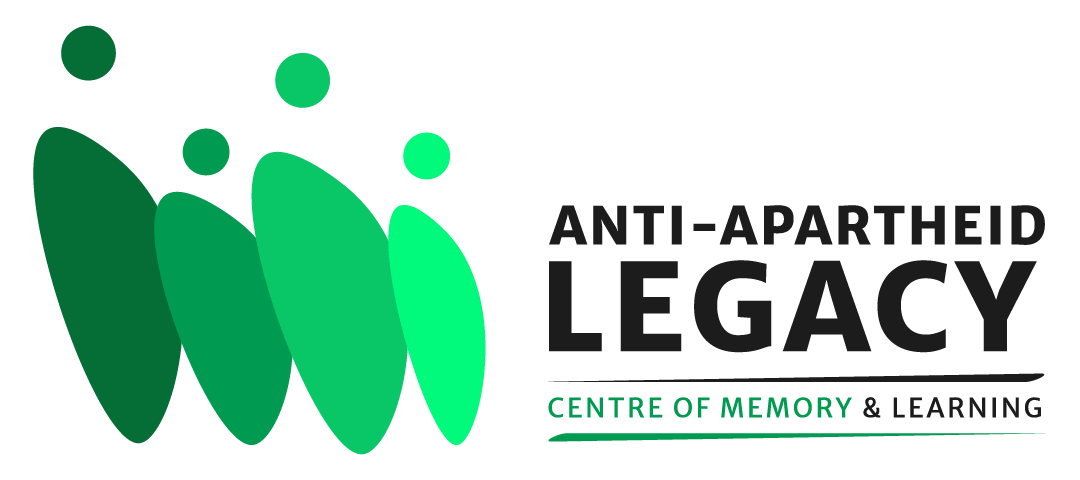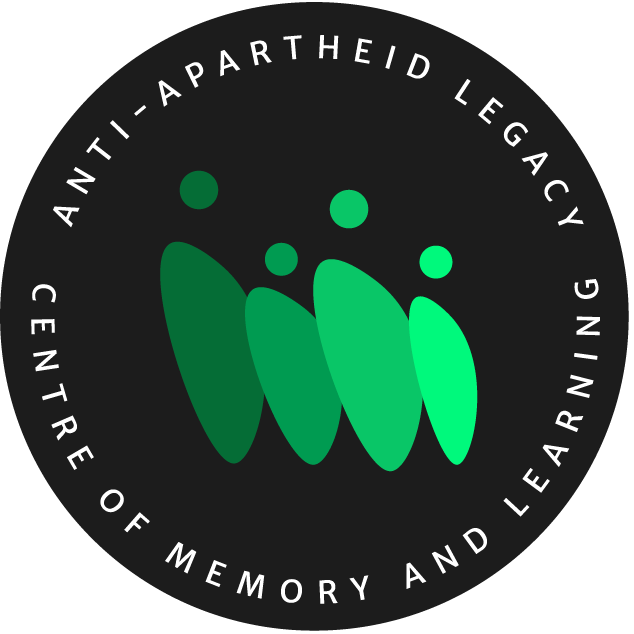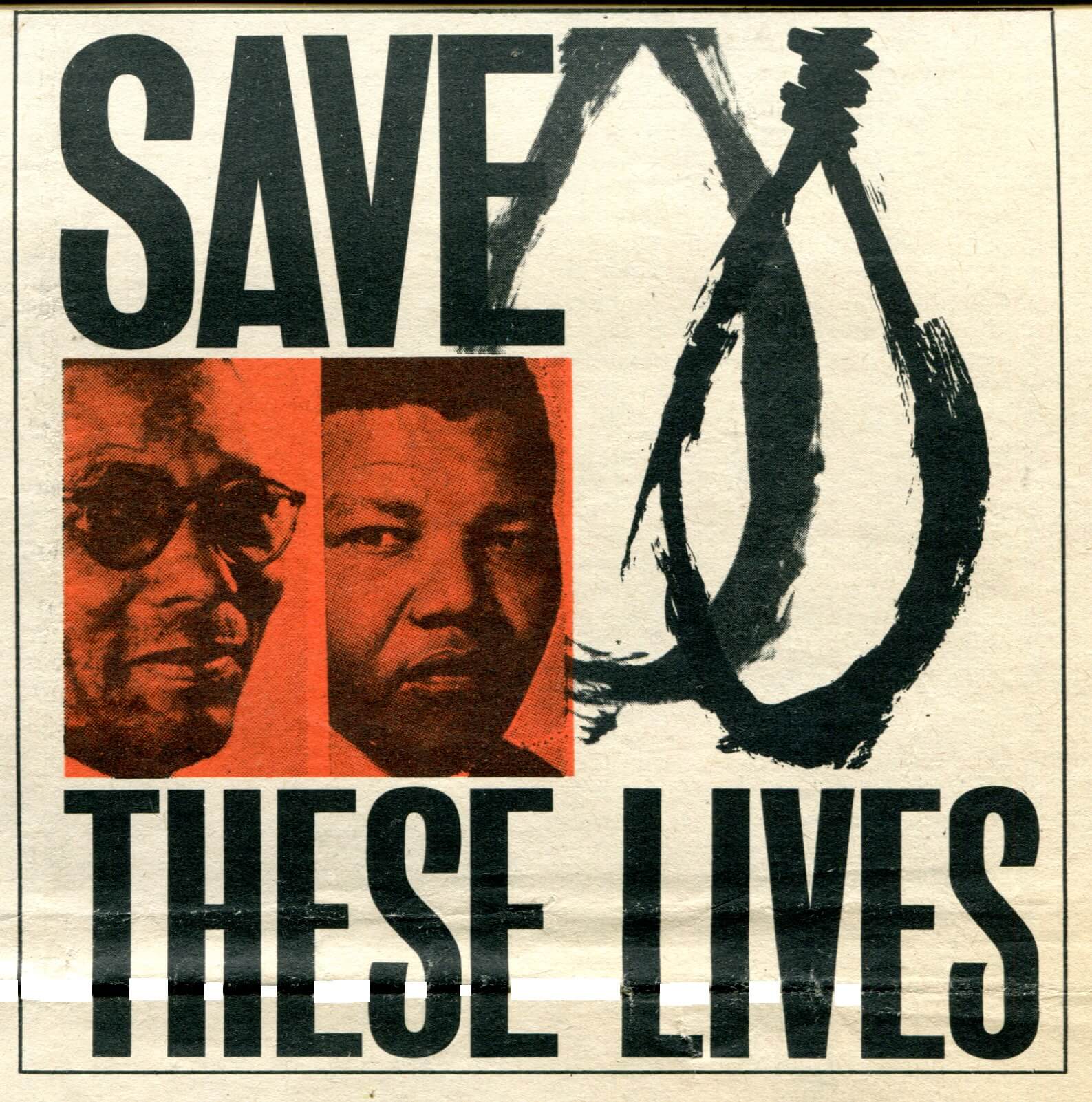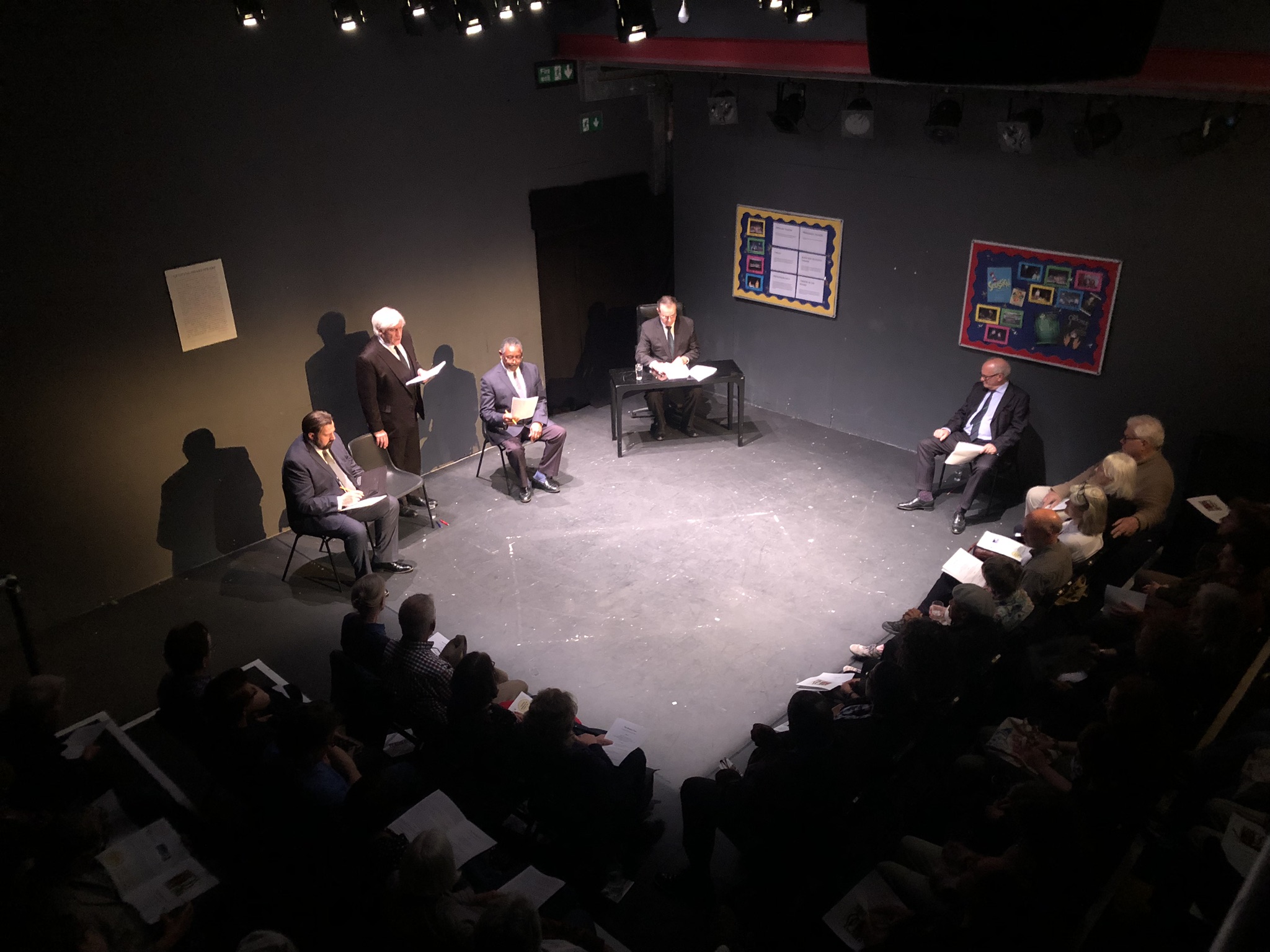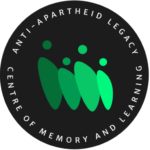The Rivonia Trial
A new Tribunal Play by Matthew Hahn
On Sunday 26th May 2024, Anti-Apartheid Legacy in collaboration with The Joffe Charitable Trust, organised the first staged reading of playwright Matthew Hahn’s, latest work ‘The Rivonia Trial’, a tribunal play. The Park Theatre in Finsbury Park kindly supported us by offering their Park90 studio in which the piece was presented. The development of the play and the event on the 26th May was enabled by the generosity of the Joffe Family and the Joffe Charitable Trust.
2024 marks 60 years since the now famous Rivonia Trial in South Africa took place during which Nelson Mandela and nine co-defendants were tried for 221 acts of sabotage. The trial and the play were named after the Johannesburg suburb of Rivonia, where 19 leaders of the African National Congress were arrested at Liliesleaf Farm – a location they had believed was safe and unknown to the Apartheid state.
Whilst Mandela’s brave and impressive conduct throughout the trial is widely known and documented, the testimony of his co-defendant Walter Sisulu is given centre stage in this play. Sisulu’s physical stature was not like Mandela’s but his politics and courage were as strong and enabled him to take the stand with the inner confidence of a principled man.
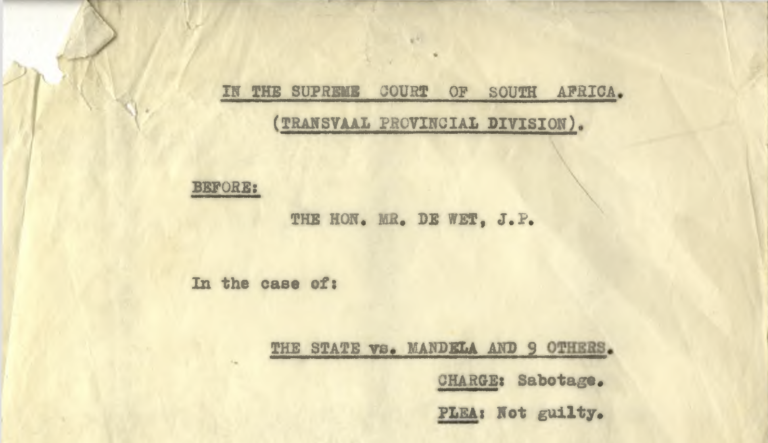
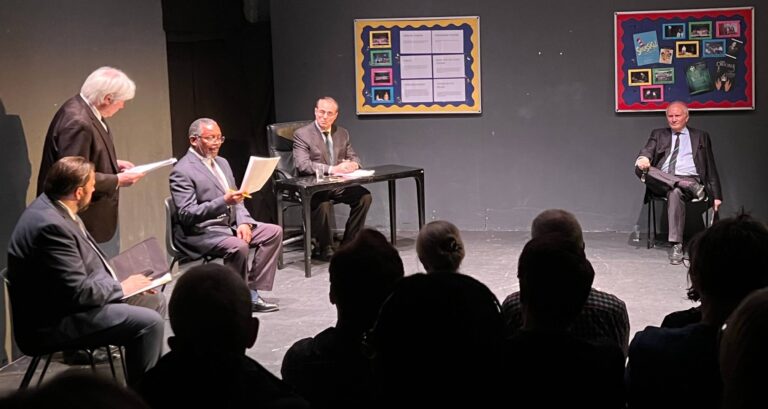
Hahn has based the play on Sisulu’s words and those of his defence team, the prosecutor and the judge.
Every seat in the studio was filled as the audience waited with anticipation for the reading to begin. A tribunal play lends itself to a simple staging so in effect the audience members take on the roles of people in the public gallery of the court.
Our focus was on this all-male cast dressed in suits which subtly reflected their differences in character and status. Simple yet stark lighting and use of chairs were all that was required to evoke the court atmosphere aside from a desk behind which the judge, played by Paul Herzberg, Mr Justice de Wet, sat presiding over the trial with a penetrating gaze.
The binarisms between those in power i.e. the white minority and the disenfranchised black majority were made apparent through Hahn’s development of the script and convincing, nuanced performances by a cast of talented actors.
Andrew Francis’ portrayal of Sisulu was compelling. He captured his unwavering commitment to the struggle for freedom and refusal to compromise or be tricked into naming his comrades. Sisulu remains clear and unbreakable throughout despite a heavy-handed approach from state prosecutor Percy Yutar, played with a steely edge and rising energy by Jonathan Tafler. What is crystal clear is why the ANC was forced to move from passive resistance to armed struggle when faced with such a brutal, racist regime.
The defence team’s advocate and lead counsel Bram Fischer was played by Jack Klaff. His performance conveyed Fischer’s astute legal mind as well as his courage as an Afrikaaner who was viewed as a traitor by the Apartheid regime.
Actor Will Train played the part of instructing attorney Joel Joffe. His role in the play was to deliver the closing words, a form of epilogue, as the audience was told what happened to the defendants and their defence team. This was made more poignant by the fact that Joel’s eldest daughter, as well as his brother and sister-in-law were in the audience.
The tense atmosphere created by the play was palpable and in just 45 minutes, the audience was given much to reflect upon.
After an interval in which the audience enjoyed refreshments and light snacks thanks to the generosity of the project’s supporters, we returned to the studio for a panel discussion hosted by Alex Jacobs, Chair of the Joffe Charitable Trust. The panel consisted of His Excellency Jeremiah Nyamane Mamabolo, High Commissioner to the United Kingdom of Great Britain and Northern Ireland, Professor Kate O’Regan a former judge of the South African Constitutional Court (1994 – 2009) and Dr Kojo Koram, Reader in Law at Birkbeck School of Law, University of London and author of ‘Uncommon Wealth: Britain and the Aftermath of Empire’.
They each offered their reflections on the play’s themes; The South African High Commissioner spoke of how, during the liberation struggle, the ANC leadership showed huge courage and integrity and were not seeking power for themselves as individuals but rather for the greater good. Kate O’Regan talked about the need to keep justice at the centre of the legal system which was not the case under Apartheid law. Kojo Koram, in reference to Franz Fanon’s writings, spoke about the dehumanisation of people that took place in South Africa and continues in contemporary struggles for freedom.
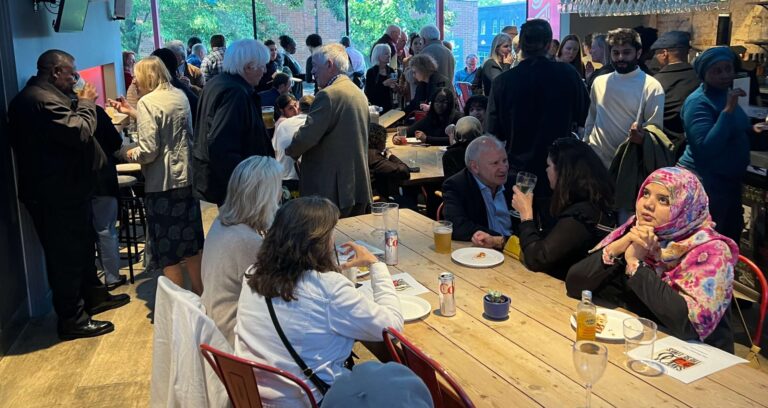
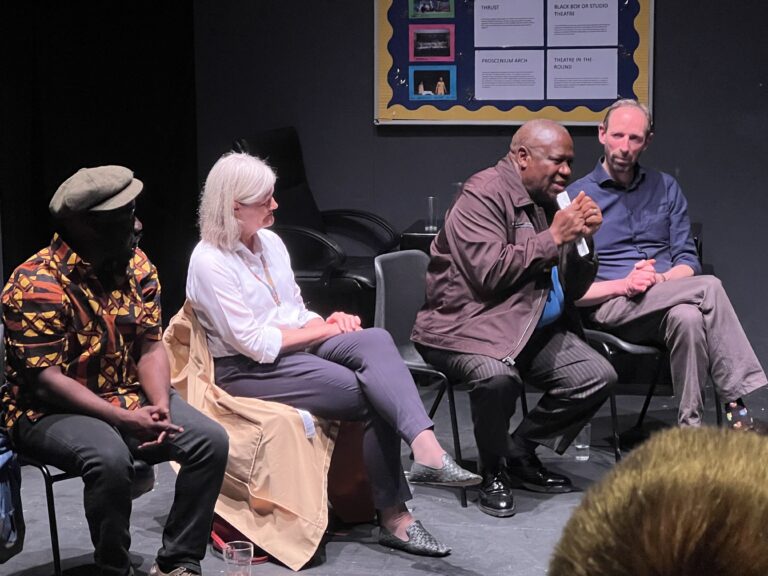
The audience members were of varying ages and backgrounds which reflected the range of people we have been engaging with through our work with different communities including local schools (EGA school), universities (London Metropolitan and RCA), South African disapora and youth forum representatives. A young man was the first to pose a question about why Mandela was the most well known. The South African HC responded by saying that more senior leaders were willing to make room for others to take on political responsibilities. It is worth noting that Mandela was already leading the armed wing of the ANC. Political leaders such as Chief Albert Luthuli, J.B. Marks and many others paved the way for the likes of Mandela, Sisulu and their contemporaries both male and female.
There were also comments from members of the audience who had been anti-apartheid activists here in the U.K. One of them reminded us that once Mandela and his comrades were finally released it was hard to find anyone in this country who admitted to having been pro Apartheid, whereas in fact, it took decades of hard work to raise awareness and galvanise people into building the British Anti-Apartheid Movement.
The resistance to Apartheid did not begin or end with the Rivonia Trial. Whilst Mandela and his comrades were incarcerated, the Soweto Uprising took place, Steve Biko was murdered by the state police, Ruth First, Dulcie September and later Chris Hani were assassinated and countless others murdered whilst held in detention or injured in attacks by the regime. The play and the discussion generated an interest to learn more about the unique struggle for freedom in South Africa.
The evening furthered our work to shine a light on this incredible history and provided a platform for connecting with struggles for justice that are happening in today’s world.
The play offers hope as it reminds us that despite such a powerful, violent, racist regime based on divide and rule, activists came together both in South Africa and internationally to bring it to an end.
Written by Nadia Joseph, June 2024.
Asked what they’d taken away from the evening, the audience feedback included:
“It was a precious opportunity to get to know the rather unknown side of the trial with Sisulu – much better known for Nelson Mandela obviously. I was also very surprised by the fact that this relatively unknown side of the trial contains a rich resource to consider the definition of violence under racism, colonialism, imperialism and apartheid.”
“Importance of reflecting on history to understand the role of ethics in legal and political spheres today, both at home and abroad.”
“ A deep appreciation of Walter Sisulu and the vast network of anti-apartheid campaigners who made contributions. Also excitement about the opportunity to use their story to inspire and empower young people to take action around things they care about.”
Further information:
